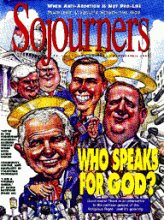The Religious Right has hijacked American evangelicalism and made it an aberration in the global evangelical community. Many of us who are evangelicals in America no longer feel that we have a home in the movement.
Through the social upheavals of the '50s and '60s, American evangelicalism was little moved. Culturally the movement has always been somewhat conservative. And in those days most conservative Protestants were taught that faith was solely related to the spiritual realm, so few evangelicals got involved in working for social or political change during the civil rights or anti-poverty movements.
As the decade of the '70s began, a number of evangelicals belatedly began to become involved in struggling with issues like racism, world hunger, and the environment. The Chicago Declaration in 1973 and the Lausanne Covenant in 1974 reflected this awakening of the evangelical consciences toward Christian social responsibility.
In 1978, Billy Graham, Christianity Today, and Wheaton College were at the front of the parade as the discussion of Christian social responsibility was still expanding. Suddenly, seemingly out of nowhere, Jerry Falwell, the Moral Majority, Timothy LaHaye, the Religious Roundtable, and others hijacked the evangelical parade and gave it a decisive wrench to the Right. It has never recovered.
At the end of the Reagan era, the Moral Majority folded its tents and slipped away. But with the election of Democrat Bill Clinton, the new flagship of the Religious Right experienced remarkable growth. The Christian Coalition, started by Pat Robertson, is 1.5 million strong and still growing at a rapid clip. Ralph Reed, the young chief executive officer of the Christian Coalition, takes credit for the recent Republican landslide.
Read the Full Article

